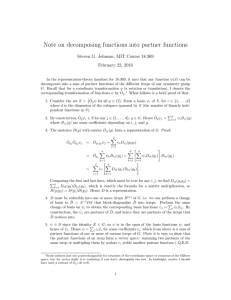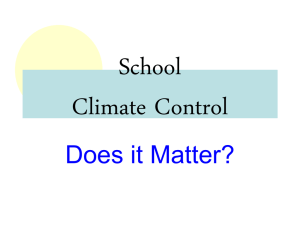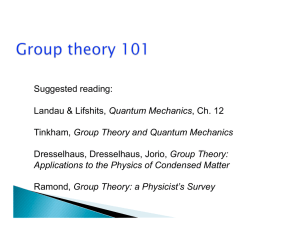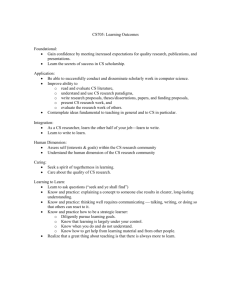Low Dimensional Representations of the Loop Braid Group LB Liang Chang 3
advertisement
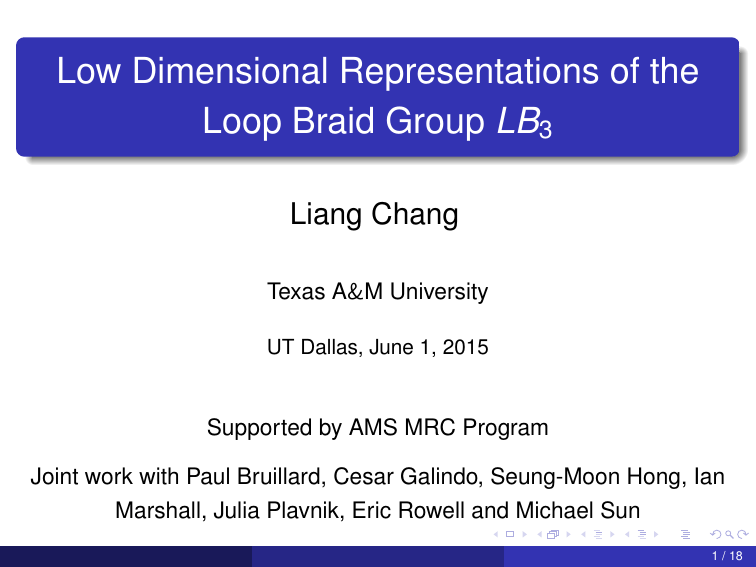
Low Dimensional Representations of the
Loop Braid Group LB3
Liang Chang
Texas A&M University
UT Dallas, June 1, 2015
Supported by AMS MRC Program
Joint work with Paul Bruillard, Cesar Galindo, Seung-Moon Hong, Ian
Marshall, Julia Plavnik, Eric Rowell and Michael Sun
1 / 18
Outline
Loop braid group LB3
Irreps of B3 for dimension d ≤ 5
Irreps of LB3 for dimension d ≤ 5
2 / 18
Braid Group B3
The 3-strand braid group B3 is a group generated by σ1 and σ2
subject to
σ1 σ2 σ1 = σ2 σ1 σ2
3 / 18
Loop Braid Group LB3
The loop braid group LB3 is defined as the motion group of 3
unknotted and unlinked oriented circles in R 3 .
4 / 18
Loop Braid Group LB3
LB3 is generated by σ1 , σ2 , s1 and s2 subject to
Braid relation: σ1 σ2 σ1 = σ2 σ1 σ2
Permutation relation: s1 s2 s1 = s2 s1 s2 , s12 = s22 = 1
Mixed relation: s1 s2 σ1 = σ2 s1 s2 , σ1 σ2 s1 = s2 σ1 σ2
5 / 18
Irreps of B3 for dimension d ≤ 5
Tuba and Wenzl completely classified all irreducible B3
representations of dimension d ≤ 5.
For any dim ≤ 5 irrep of B3 , there exists a basis, with
respect to which A = ρ(σ1 ) and B = ρ(σ2 ) act in ordered
triangular form.
λ1 · · · ∗
λd 0 0
A = 0 . . . ... , B = ... . . . 0
0
0
λd
∗
· · · λ1
where all nonzero entries are rational functions of λ1 , . . . , λd
and γ := (λ1 · · · λd )1/d .
6 / 18
Irreps of B3 for dimension d ≤ 5
"
#
"
#
λ1 λ1
λ2
0
d = 2: A =
, B=
0 λ2
−λ2 λ1
λ1 λ1 λ3 λ2−1 + λ2 λ2
d = 3: A = 0
λ2
λ2 ,
0
0
λ3
λ3
0
0
B = −λ2
λ2
0
λ2 −λ1 λ3 λ2−1 − λ2 λ1
7 / 18
Irreps of B3 for dimension d ≤ 5
λ1 (1 + D −1 + D −2 )λ2 (1 + D −1 + D −2 )λ3
0
λ2
(1 + D −1 )λ3
d = 4: A =
0
0
λ3
0
0
0
λ4
0
0
−λ
λ3
0
3
B=
Dλ2
−(D + 1)λ2
λ2
3
3
2
2
−D λ1 (D + D + D)λ1 −(D + D + 1)λ1
p
where D = λ2 λ3 /λ1 λ4 .
λ4
λ4
,
λ4
λ4
0
0
0
λ1
8 / 18
Irreps of B3 for dimension d ≤ 5
d = 5:
λ1 ∗ ∗ ∗ ∗
0 λ
∗ ∗ ∗
2
A = 0 0 λ3 ∗ ∗ ,
0 0 0 λ4 ∗
0 0 0 0 λ5
λ5 0 0 0 0
∗ λ
0 0 0
4
B = ∗ ∗ λ3 0 0
∗ ∗ ∗ λ2 0
∗ ∗ ∗ ∗ λ1
where all nonzero entries are rational functions of
λ1 , . . . , λ5 and γ := (λ1 · · · λ5 )1/5 .
9 / 18
Irreps of LB3 extended from ρ TW
Goal: For dimension d ∈ {2, 3, 4, 5}, classify the irreps of
LB3 over C extended from Tuba-Wenzl representation ρ TW .
That is, given A and B in Tuba-Wenzl representation, find
matrices S1 and S2 such that
S1 S2 S1 =S2 S1 S2 , S12 = S22 = Id
S1 S2 A =BS1 S2 , ABS1 = S2 AB
10 / 18
Irreps of LB3 extended from ρ TW
Strategy:
1. Find S := S1 S2 satisfying S 3 = Id , SA = BS.
2. Solve for S1 and S2 from S.
"Standard solution": S = cAB for (σ1 σ2 )3 is in the center of
B3 .
Extending S to a rep of S3 is not always possible.
An matrix S over C with S 3 = Id extends to a rep of S3 if and
only if tr (S) ∈ R
11 / 18
Irreps of LB3 extended from ρ TW
Strategy:
1. Find S := S1 S2 satisfying S 3 = Id , SA = BS.
2. Solve for S1 and S2 from S.
"Standard solution": S = cAB for (σ1 σ2 )3 is in the center of
B3 .
Extending S to a rep of S3 is not always possible.
An matrix S over C with S 3 = Id extends to a rep of S3 if and
only if tr (S) ∈ R
11 / 18
Irreps of LB3 extended from ρ TW
Strategy:
1. Find S := S1 S2 satisfying S 3 = Id , SA = BS.
2. Solve for S1 and S2 from S.
"Standard solution": S = cAB for (σ1 σ2 )3 is in the center of
B3 .
Extending S to a rep of S3 is not always possible.
An matrix S over C with S 3 = Id extends to a rep of S3 if and
only if tr (S) ∈ R
11 / 18
Irreps of LB3 extended from ρ TW
Let ω be a third root of unity.
Proposition
2
For d ∈ {2, 3, 4, 5}, S = (−1)d−1 (λ1 · · · λd )− d AB satisfies S 3 = Id
and has eigenvalues ω and ω 2 appearing in pair.
In
R
S =U
..
.
R
−1
U , where R = ω 0 .
0 ω2
12 / 18
Irreps of LB3 extended from ρ TW
Proposition
The above S induces a representation of the permutation group,
that is, there exist S1 and S2 s.t. S12 = S22 = Id and S = S1 S2 .
ε1
Sk = U
..
−1
U ,
.
εn
φ
Pk 1
..
.
φ
Pk m
"
where εi ∈ {1, −1}, k ∈ {1, 2} and
Pkα
0
=
φ ωk
#
φ −1 ω −k
for any φ 6= 0.
0
13 / 18
Irreps of LB3 extended from ρ TW
Theorem
For each dimension d ∈ {2, 3, 4, 5}, every irrep of B3 extends to
an irrep ρ (ε,φ ) of LB3 by the above S1 and S2 .
14 / 18
Irreps of LB3 extended from ρ TW
Theorem
For each dimension d ∈ {2, 3, 4, 5}, every irrep of B3 extends to
an irrep ρ (ε,φ ) of LB3 by the above S1 and S2 .
Remark
There exists 6-dimensional irrep of B3 that can not be extended.
14 / 18
Irreps of LB3 extended from ρ TW
Theorem
For each dimension d ∈ {2, 3, 4, 5}, every irrep of B3 extends to
an irrep ρ (ε,φ ) of LB3 by the above S1 and S2 .
Remark
There exists 6-dimensional irrep of B3 that can not be extended.
Conjecture
For any dimension, an irreducible B3 representation can be
extended if and only if AB can be normalized to be an S such
that S 3 = I and tr (S) ∈ R.
14 / 18
Irreps of LB3 extended from ρ TW
Question: Are there "non-standard" solutions for S?
15 / 18
Irreps of LB3 extended from ρ TW
Question: Are there "non-standard" solutions for S?
Proposition
Suppose matrices A and B corresponds to a Tuba-Wenzl irrep.
The equation SA = BS has the general solution
d−1
S=
∑ an B n AB
n=0
for a0 , . . . , ad−1 ∈ C.
15 / 18
Irreps of LB3 extended from ρ TW
λ1
Example: A = 0
0
λ1 λ3
λ2
λ2
0
λ3
0
0
λ2
λ2
0
λ2 , B = −λ2
λ1 λ3
−
λ
λ
λ
−
λ3
2
2
1
λ2
0 0 ∗
S = a0 AB + a1 BAB + a2 B 2 AB = 0 ∗ ∗
∗ ∗ ∗
⇒ S 2 and (BSA)2 are skew upper triangular matrices.
⇒ 6 homogeneous linear eqns of a0 a1 , a0 a2 , a12 , a1 a2 and a22
with coefficients in C[λ1 , λ2 , λ3 ].
⇒ a1 = a2 = 0 if (λ1 , λ2 , λ3 ) is not a zero of a set of polynomials
in C[λ1 , λ2 , λ3 ].
16 / 18
Irreps of LB3 extended from ρ TW
Theorem
For each dimension d ∈ {2, 3, 4, 5}, there is Jd ⊂ C[λ1 , . . . , λd , δ ]
2
such that if (λ1 , . . . , λd ) ∈
/ V (Jd ), S = (−1)d−1 (λ1 · · · λd )− d AB is
the only solution for the loop braid relations. Therefore, for such
generic (λ1 , . . . , λd ), ρ (ε,φ ) are all irreps of LB3 extended from the
given Tuba-Wenzl representation.
17 / 18
Irreps of LB3 extended from ρ TW
Theorem
For each dimension d ∈ {2, 3, 4, 5}, there is Jd ⊂ C[λ1 , . . . , λd , δ ]
2
such that if (λ1 , . . . , λd ) ∈
/ V (Jd ), S = (−1)d−1 (λ1 · · · λd )− d AB is
the only solution for the loop braid relations. Therefore, for such
generic (λ1 , . . . , λd ), ρ (ε,φ ) are all irreps of LB3 extended from the
given Tuba-Wenzl representation.
J2 = 0/
J3 = h (λ1 + λ2 )(λ2 + λ3 )(λ3 + λ1 ) i
If (λ1 , λ2 , λ3 ) ∈ J3 , S = a0 (t)AB + a2 (t)B 2 AB.
1
12
4
J4 = h δ Πn=1 Σi6=n (λi + ) i
λi
J5 | det(M14×14 (λ1 , . . . , λ5 , δ ))
17 / 18
Thank You!
18 / 18
